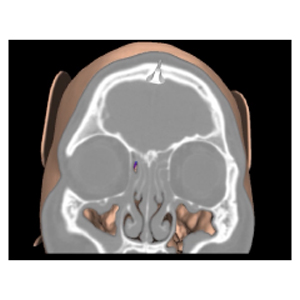Herbert Ross: Among the First in the U. S. to Benefit from a New Surgical Navigation System
 The Department of Otorhinolaryngology-Head and Neck Surgery at McGovern Medical School at UTHealth was the first site in the United States for the innovative Acclarent Navigation System. Among the first patients treated using the new system was Herbert Ross, a 67-year-old resident of Lake Jackson, Texas.
The Department of Otorhinolaryngology-Head and Neck Surgery at McGovern Medical School at UTHealth was the first site in the United States for the innovative Acclarent Navigation System. Among the first patients treated using the new system was Herbert Ross, a 67-year-old resident of Lake Jackson, Texas.
Ross had undergone an earlier surgery for removal of nasal polyps in 2007. “They came back with a vengeance,” he says. “For the last two or three years, I could hardly breathe at all out of my right nostril, especially during the spring, and nasal sprays didn’t help. ”
In June 2017, he saw an ENT, who ordered a CT scan. When the physician saw the results, he referred Ross to Martin J. Citardi, MD, chair of the Department of Otorhinolaryngology-Head & Neck Surgery at McGovern Medical School (part of The University of Texas Health Science Center at Houston) and chief of otorhinolaryngology at Memorial Hermann-Texas Medical Center.
“Mr. Ross had significant chronic nasal rhinosinusitis with nasal polyposis, filling the entire ethmoid cavity,” Dr. Citardi says. “The proximity of the polyps to the eye made him an excellent candidate for the precise surgical navigation of the Acclarent system. ”
Although surgical navigation has been in use for more than 20 years, Acclarent navigation offers several unique features. The technology that it uses to track instrument position is new and based on technology originally developed for cardiac navigation. The tracking system incorporates tiny microsensors placed in wires that can be passed through other instruments, in theory providing greater accuracy than other platforms.
“Acclarent refined the registration process so that the preoperative CT scan aligns very well to patient anatomy,” Dr. Citardi says. “Getting that right is essential, and they do it very well. The system also has unique ways of presenting CT scan data in a virtual 3-D model. It’s a strong system for any kind of endoscopic sinus or skull-base surgery, and it is especially suitable for procedures with greater complexity. ”
After listening to Dr. Citardi’s explanation of the surgery, Ross felt comfortable moving forward with the procedure. After a two-hour recovery from anesthesia, his wife drove him home. “After that my recovery was very fast,” Ross says. “Bleeding was minimal, and I took only one or two pain pills. I can’t speak highly enough of Dr. Citardi, and I appreciate the work he did. It’s been a long time since I could breathe this well. ”
“We believe it’s important to bring the latest technology to patients who have disorders that are difficult to treat,” Dr. Citardi says. “We’re willing to explore new technology and apply it in novel ways, which is one of the reasons I work in an academic medical center and collaborate with industry. Treatment will never advance unless we continue doing this, and there’s always room for improvement. ”
Schedule an Appointment
Call Us
To schedule an appointment over the phone, give our office a call at (713)-486-5019.
Online Appointment Requests
Patients may submit their appointment requests through our online Appointment Request Form.
Both current and new patients can request appointments through MyUTHealth, our patient portal.